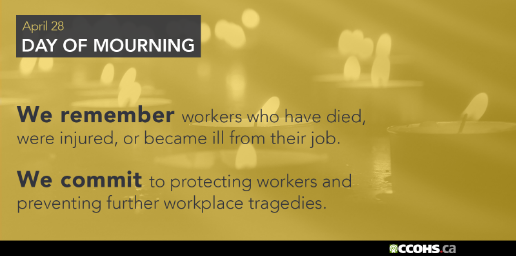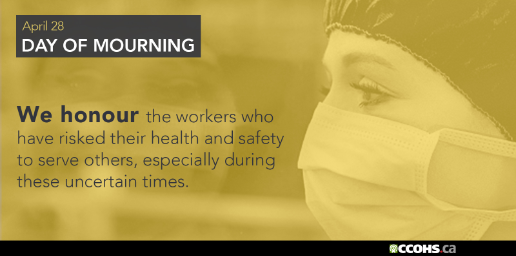If you’re in Massachusetts, USA, tune in to MassCOSH’s Worker’s Memorial Day ceremony. 28 April.
Join a TUC online meeting for Workers’ Memorial Day, where we will be hearing from trade union voices from around the world, fighting for the health and safety of working people and remembering those who lost their lives to work.
Register here: https://zoom.us/webinar/register/WN_uEKzShAsR3SIcNowyzTwEQ
Speakers include:
https://www.tuc.org.uk/events/tuc-international-wmd-call
SAVEZ Samostalnih Sindikata Srbije
In the meeting of the International Day of Protection at Work, which is celebrated on April 28., the Alliance of Independent Trade Unions of Serbia in cooperation with the Alliance of Independent Trade Unions for the City of Krusevac conducted a campaign for workplace safety.
Global Launch of the World Day for Safety and Health at Work 2021
Anticipate, prepare and respond to crises – Invest Now in Resilient Occupational Safety and Health (OSH) Systems
The aim of this global virtual webinar is to stimulate dialogue on the importance of investing in safety and health at work in responding to emergencies and crises affecting workplaces, such as the COVID-19 pandemic.
The Zoom webinar will be held in English and interpreted in French and Spanish. Apr 28, 2021, 1:30 pm (CEST). Registration and further details
Capital District Area Labor Federation (CDALF) and Northeast New York Coalition for Occupational Safety & Health (NENYCOSH), with affiliated Unions and community partners, will be observing Workers Memorial Day. They will come together to honor injured and fallen workers from around Albany and New York State.
Wednesday, April 28th | 12 pm (EDT) | Academy Park, Albany
For those unable make it in person, the event will also be streamed via Facebook • More details
La pandemia demostró que la salud y seguridad en el trabajo es un derecho fundamental.
Porque queremos cuidar la vida. Porque queremos cuidar nuestro trabajo. Las y los jóvenes constructores seguimos militando por una nueva cultura preventiva. pic.twitter.com/nyXHkXid4k
— Juventud UOCRA (@Juventud_UOCRA) April 21, 2021
As we approach International Workers’ Memorial Day, acting national officer for health and safety at UK’s health union Unison, Robert Baughan, looks back at a year when workplace safety took centre stage. More
Victorian Trades Hall Council is marking International Workers’ Memorial Day with a ceremony in Victoria – sign up details can be found on their IWMD webpages
Marked annually in Canada on April 28, the National Day of Mourning is dedicated to remembering those who have lost their lives, or suffered injury or illness on the job or due to a work-related tragedy.
In 1991, eight years after the day of remembrance was launched by the Canadian Labour Congress, the Parliament of Canada passed the Workers Mourning Day Act making April 28 an official Day of Mourning. Today the Day of Mourning has since spread to more than 100 countries around the world and is recognized as Workers’ Memorial Day, and as International Workers’ Memorial Day by the International Labour Organisation (ILO) and the International Trade Union Confederation (ITUC).
It is the hope of CCOHS that the annual observance of this day will help strengthen the resolve to establish safe and healthy conditions in the workplace, and prevent further injuries, illnesses, and deaths. As much as this is a day to remember the dead, it is also a call to protect the living and make work a place where people can thrive.
Source: Fatalities, by Age and Jurisdiction 2019, Association of Workers’ Compensation Boards of Canada (AWCBC),National Work Injury/Disease Statistics Program (NWISP)
Source: Lost Time Claims, by Age and Jurisdiction, 2019, Association of Workers’ Compensation Boards of Canada (AWCBC),National Work Injury/Disease Statistics Program (NWISP)
For further statistical information visit the AWCBC National Work Injuries Statistics Program.
Show your commitment by sharing the following messages on your social media channels.

We remember workers who have died, were injured, or became ill from their job. We commit to protecting workers and preventing further workplace tragedies.

We honour the workers who have risked their health and safety to serve others, especially during these uncertain times.
![]()
Canadian national trade union body CLC-CTC has published a comprehensive nationwide listing of activities planned to mark International Workers’ Memorial Day. More